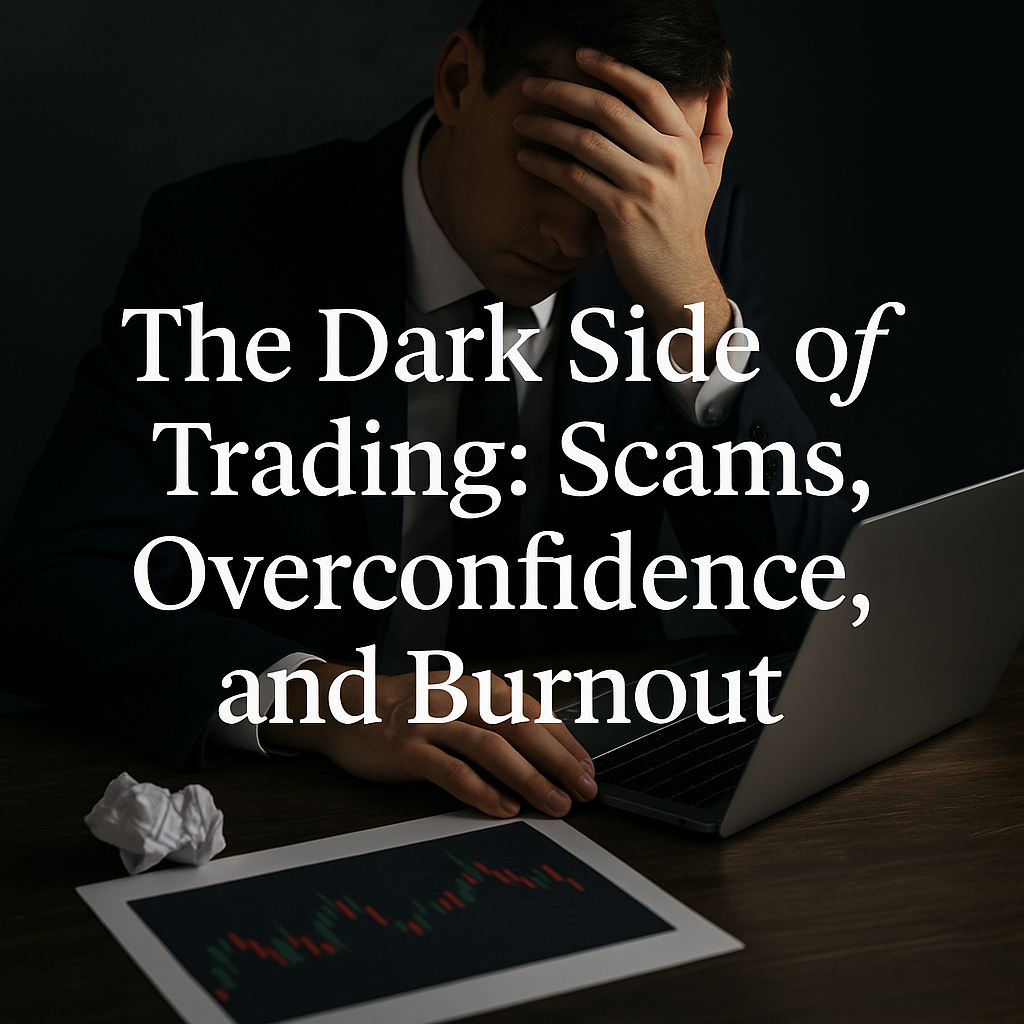Introduction: The Reality Behind the Hype
Trading is often glamorized — screens filled with green candles, fast profits, freedom from 9–5 jobs. But behind the polished Instagram posts and YouTube thumbnails lies a side of trading few talk about openly: the risks that aren’t just financial, but psychological, emotional, and even ethical.
In this post, we’ll explore three major hidden dangers that affect both new and experienced traders alike: scams, overconfidence, and burnout. Understanding them is essential not only for protecting your capital — but also your long-term mental clarity, motivation, and integrity.
1. Scams in the Trading Industry
False Prophets and Paid Gurus
One of the most widespread issues in the online trading world is the rise of “fake gurus.” These are individuals who sell courses, signals, or mentorships — often without any verified track record or transparency. Their marketing relies on screenshots of luxury lifestyles, fake testimonials, or demo-account profits.
How to spot them:
- No verified track record (e.g., MyFxBook, audited statements)
- Avoidance of drawdown transparency
- Unrealistic promises: “Double your account in 30 days”
- Heavily edited profit screenshots
Signal Groups and Copy Trading Pitfalls
Paid signal services and copy-trading platforms can seem like a shortcut, but they often fail due to:
- Lack of context for trades (no strategy explanation)
- Risk mismatches (follower accounts don’t reflect leader account size)
- Conflicting incentives (traders may earn more from subscribers than trading itself)
Broker Manipulation and Offshore Accounts
Unregulated or poorly regulated brokers can manipulate prices, delay withdrawals, or engage in unethical slippage practices. This especially affects traders who deposit via crypto or work with offshore brokers promising high leverage.
Protect yourself:
- Choose brokers with Tier-1 regulation (FCA, ASIC, etc.)
- Check for third-party reviews and complaints
- Never deposit more than you’re willing to lose to inaccessibility
2. Overconfidence: The Silent Portfolio Killer
It often starts with a streak of wins. Suddenly, you’re sizing up aggressively, skipping analysis, ignoring your rules. You feel invincible.
This is overconfidence — and it’s a cognitive bias that leads traders to:
- Overestimate their skill or edge
- Underestimate market risks
- Ignore risk management
- Hold losers longer and take profits too early
The Dunning-Kruger Curve in Trading
New traders often experience a “honeymoon phase” where early wins falsely signal mastery. This is followed by sharp losses, leading to emotional instability and poor judgment.
Countermeasures:
- Keep a trading journal and review emotional triggers
- Cap position sizes regardless of winning streaks
- Use third-party review or accountability (peer or mentor feedback)
- Let data and strategy dictate decisions, not gut feeling
3. Burnout: When Passion Becomes Pressure
Trading requires intense focus, emotional discipline, and constant adaptation. Over time, this pressure can create mental fatigue, loss of motivation, and even physical symptoms like insomnia or anxiety.
Burnout is common when:
- Trading becomes obsessive (checking charts constantly)
- Results determine self-worth or confidence
- You’re trading too many hours without rest
- Losses lead to revenge trading or emotional spirals
Recognizing Early Signs:
- Difficulty concentrating on your strategy
- Avoiding reviewing trades due to emotional discomfort
- Frustration even after small losses
- Irritability or withdrawal from other life activities
Sustainable practices:
- Define trading hours and respect off-time
- Set process-based goals (e.g., follow your plan 90% of the week), not just P&L goals
- Take breaks — even a day or week off can provide reset
- Stay connected with a community to reduce isolation
Final Thoughts: Trading With Awareness
There’s no shame in acknowledging the darker sides of trading. In fact, doing so is a sign of maturity — the kind of mindset that builds a long-term, sustainable trading career.
Understanding and guarding against external traps (like scams) and internal threats (like overconfidence and burnout) helps ensure that trading enhances your life, rather than consumes it.
Successful traders aren’t just skilled in strategy — they’re grounded in self-awareness and committed to continual learning.
Community Note
At Tokyo Traders, we encourage open discussions about the emotional and ethical dimensions of trading. Join us for:
- Monthly trading psychology sessions
- Scam awareness workshops
- Peer support and journaling challenges
Trading is personal. It’s not just about charts — it’s about you.


